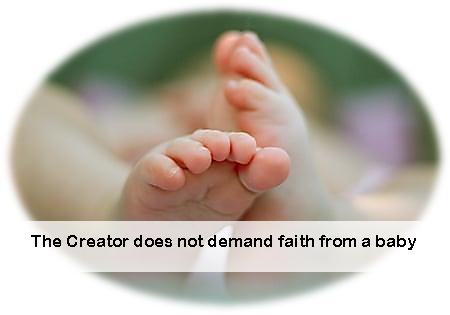Are Infants in the Church and Unbelievers Outside of it in the Same Position?
Are Infants in the Church and Unbelievers Outside of it in the Same Position?

The Controversy⤒🔗
Many evangelical Christians, who accept Scripture as God's Word and want to live by it, reject the baptism of infants. One of their arguments is that infant baptism is commanded nowhere in the New Testament, and that it speaks about the baptism of believers. Baptists point here to the way in which the apostle Paul speaks about the meaning and aim of baptism in, e.g., Romans 6 and Colossians 2.
Paul addresses believers who were baptized and says in Romans 6:3-8,
Do you not know that all of us who have been baptized in Christ Jesus were baptized into His death? We were buried therefore with Him by baptism into death … For if we have been united with Him in a death like His… We know that our old self was crucified with Him … But if we have died with Christ…
The Baptist’s argumentation is that Paul speaks here about baptism as a sign and seal of what God has done in the hearts of those who believe. They have to hold on in faith to that work of God in them as pictured in their baptism. They must believe that that work in them is real. Since now regeneration, a being buried and raised with Christ, is through hearing and believing the gospel, upon which the believer is baptized, and since an infant cannot hear the gospel and believe, it should not be baptized. It is clear, says the Baptist, that baptism is for those in whom God has worked what their baptism pictures. It is for those who have appropriated Christ and His salvation, that is, who, through faith made it their own property.
The consequence is that there is no real difference between an unbeliever and a little child in the church. Both still lack faith. Both still need (the beginning of) God's work of regeneration. So both still lack salvation.
But to both also comes the promise of the gospel: if you accept Christ as your personal Saviour in true faith, you, too, will be saved.
Romans 6:3-11 does not apply to infants in the church.
I would like to begin the defence of the practice of the church throughout the centuries with referring to the unity of the Old and the New Testament on a specific point, that of the Fifth Commandment.
The Fifth Commandment←⤒🔗
The Fifth Commandment asks obedience to parents and addresses children of all ages. How can this Fifth Commandment be a part of the Decalogue, the Ten Words of the Covenant? The answer is simple. Children belong to God's covenant people. When God made the covenant with Israel, the people whom He delivered from the slavery in Egypt to be His own precious possession, the children were included. Therefore, when He spoke to His people, when establishing the covenant, it was only natural that He addressed the children too. All this was according to God's promise to Abraham when He made His covenant with him. He promised to be the God of Abraham and of Abraham's children in their generations (Genesis 17).

Since, therefore, the children, too, were part of God's precious possession; He had a word of instruction for them also. They, too, had to live out of the faith that the LORD was their God and Redeemer. God addressed them in the context of the family. The family as unit belongs to God's creation work and is a basic building block of a people or nation. So the LORD said to them, "Honour your father and your mother, that your days may be long in the land which the LORD your God gives you." The presupposition is that father and mother, belonging to Israel, will bring up their children in the fear of the LORD, in love for Him and to obey His will. The instruction of the father and the teaching of the mother are thus dominated by the covenant. To honour father and mother means to give heed to their covenantal education. In this way Israel would continue in the covenant with God throughout its generations.
In particular the book of Proverbs works this out. For instance, 23:22, 24, 25: "Hearken to your father who begot you, and do not despise your mother when she is old. The father of the righteous will greatly rejoice; he who begets a wise son will be glad in him. Let your father and mother be glad, let her who bore you rejoice." A wise and righteous son is one who fears the LORD and lives with Him and for Him, according to His Word. When Proverbs teaches that the foolish, unrighteous, disobedient son will perish, such is a punishment from the LORD.
Now it is striking that this Fifth Commandment is used by the apostle Paul when addressing the children in the New Testament church. In his epistle to the Ephesians, in 6:1-3, he writes: "Children, obey your parents in the Lord, for this is right. 'Honour your father and mother' (this is the first commandment with a promise), 'that it may be well with you and that you may live long on the earth.'"
This use of the Fifth Word of the Covenant by Paul is of great significance. It shows clearly that Christ's apostle treats the children as included in the church, to which he addresses his letters. They are part of the people of the new covenant. Therefore, the preamble, "I am the LORD your God" (for the sake of Christ Jesus), counts for the children, too. The adult believers, having received the position of children of God through adoption, are under obligation to live in faith. The children, having the same position, are under the same obligation. That is why the apostle addresses them within the family context, together with their parents. Because they are holy, that is, they belong to the LORD, together with their believing parent(s), cf. 1 Corinthians 7:14, who will instruct them in the faith and have them instructed in it.
Our conclusion must be:
God sees and treats the children in the New Testament church in the same way as in the Old Testament. They belong to the covenant of God together with their parents. God says to the believing parents: I am your God, you belong to me with all that you are and have, all that I give you. This includes your children. They are mine, too.
When we express this belonging to God, this having the position of being God's adopted children, in New Testament terms; we can say that it means that believers and their children have the salvation which Christ obtained for God's people, in Christ. This salvation is what God gives in Christ, as proclaimed as His promise in the gospel: the forgiveness of sins and righteousness through Christ's blood, as well as the Holy Spirit who regenerates our heart and renews our life, cf. the Heidelberg Catechism, Q.A. 74 of Lord's Day 27.
Here we can see the difference in position between believers with their children and those who do not believe in Christ. Believers and their children, also the little infants, have a position within the covenant. They have salvation in Christ; God is their God in Christ. Now to those outside the covenant, to those who are still unbelievers, the gospel must be preached also. To them, too, in the gospel and its proclamation, God promises salvation in Christ. But they do not have salvation yet. God is not their God yet. In this position and condition they remain as long as they continue in their unbelief.
It is on the basis of this covenant with the believers and their children that we confess the comforting truth in the Canons of Dort, 1, 17:
We must judge concerning the will of God from His Word, which declares that the children of believers are holy, not by nature but in virtue of the covenant of grace, in which they are included with their parents. Therefore, Godfearing parents ought not to doubt the election and salvation of their children whom God calls out of this life in their infancy.

We do not confess that parents must not doubt the regeneration of these infants, but that they must not doubt their election and salvation. Not what has happened with their heart counts here, but what God has given them in the covenant with their parents in Christ.
Salvation for Parents and Children in Christ←⤒🔗
Does this mean that the children in the covenant and church of the Lord are automatically saved? Can now children in the church say: we are born in the covenant and this means automatically that we are saved, unconditionally? They cannot. There remains the need of faith and regeneration for both the parents and for the children when they grow up.
When a person hears the gospel promise of salvation in Christ for everyone who believes, and the regenerating Holy Spirit opens his heart for it, such a person receives and appropriates Christ as his Saviour. This salvation can be expressed with Paul's words in Romans 6:3-11. Those who came to faith and were baptized in Christ were baptized into His death and resurrection. They died with Him to sin and were raised with Him unto a new life for God. This salvation means, at the same time, that God makes such a person His covenant child. God is now his Father (Romans 8:13-17).
But having come to faith, the believers' possession of this salvation is not now an automatic thing. What God gives is always given in Christ. Parallel with it we can say: it is always given in promise. It will remain the "property" of the believer in the way of a living and abiding faith. Faith remains the condition. Faith remains the instrument through which he appropriates this salvation. That is why the apostle Paul admonishes the believers to persevere in faith, in order not to lose what they have (2 Corinthians 13:5, cf. Hebrews 4:1, 12:25). That is why the apostle also urges the believers to keep looking at their baptism as a picture or sign and seal of the promise of the gospel: a sign and seal of God's saving work through the cleansing blood and through the renewing Holy Spirit. That is the salvation you have in Christ!
This need of regeneration and this requirement of faith applies also to the children. For them, too, this being God's children and having salvation in Christ, is never an automatic matter. When they grow up and become increasingly able to hear and understand the gospel, according to their age and ability, the Lord will also increasingly require from them that they believe and obey Him, and appropriate personally what they have in Christ. If they do not do this, but live in sinful indifference, they are breakers of the covenant and will lose what they have in Christ. As long as they live without Christ Jesus as their Saviour and Lord, and in their life do not reckon with Him and His will, they will have God against them and His anger is upon them.
God, the Creator, is our Redeemer. In His redemption work, in the covenant, He treats us in accordance with the laws of His creation work. The family in the way it exists as parents with infants who grow older and become capable to learn and do things is His handiwork. Christ has come to save what God created. This is more than just the human soul. Christ is Saviour for soul and body. He is Saviour also for the family. The soul, the body, and, yes, also the family is for God. Compare here 1 Corinthians 6:13-20 and 7:14. In this light it is only natural that we read in the book of Acts that when the Lord opened the heart of Lydia for the gospel she was baptized "and her house" (16:15), and that also the jailer was baptized "with all his family" (16:33), and that Paul can say that he baptized "the household of Stephanus" (1 Corinthians 1:16).
Therefore, the Creator does not demand faith from a baby. But when the baby becomes an infant that can learn about things in life, first within the family, God wants the parents to teach it about Him and about Christ Jesus. God wants His little child to learn to pray. And when the little child grows up a little more and becomes able to learn more about God, about sin, and about Christ Jesus and forgiveness of sins through Him, and about loving and serving Him according to His Word, the LORD wants the child to learn these things and accept them in faith. While at first only the parents are responsible, the older the child grows, the more God will hold the child responsible.

The idea that children in the covenant (young people) become only then responsible when they have made public profession of faith is totally wrong. It ignores and denies God as Creator. God wants the children in the covenant to believe and trust Him. The older they grow the more He confronts them with the covenant obligation to live with Him in obedience of faith. Faith, also the public profession of it, is a matter of thankful obedience to the Creator and Redeemer. A life in practical unbelief in which a covenant child does not reckon with God and His will in his young life is disobedience that provokes God to anger. And unless there comes genuine conversion, this anger will consume. Terrible is it to fall in the hands of the living God, when His grace is rejected.
But does Paul in Romans 6:3-11 not address believers? Does he not tell them to hold on to God's work of salvation in their lives as a fact, as something that has taken place? Paul writes: in your baptism you were buried with Christ, in the past tense. It has happened. You have been regenerated. And this we cannot say regarding to infants, can we? Regeneration is through the Word of God that is preached, isn't it? Yes, that is what Scripture teaches us. We read it, e.g., in Romans 10:14-17, James 1:18, and in 1 Peter 1:23, 25.
However, we must not separate what God has joined. We must not take the cleansing from sin through blood and Spirit apart from Christ. We must not build on our regeneration as fact on its own, loose from Christ. Then the danger is that we build our salvation on our having been regenerated, on our being believers, on our experience of God's work in us. We are to build our faith in our God who is reliable and trustworthy, so on His Word of promise: I have given and continue to give to you Christ in salvation in Him.
When Paul says: you were buried by baptism into death, and so on, he inserts the words "with Him." It means: the believers have their cleansing from sin and renewal of life, their regeneration, in Christ. And there is the calling to continue to appropriate in faith what they have (received) in Christ. I emphasized these things above already. And I stressed too that children in the church and covenant can have and do have the same obligation. Through faith that have to make what they have in Christ their own personal possession.
And when a child in the covenant does believe and loves the LORD his God, her God, we can only say: this is the pure and sovereign, undeserved grace of God in Christ, His electing love in Christ Jesus for people who are conceived and born in sin and who are by nature children of wrath. It is all from and through and unto God. He who boasts, boasts in the LORD. To Him belongs the glory forever.

Add new comment